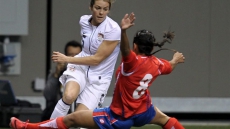VANCOUVER - A court ruling at the centre of British Columbia's protracted teachers' strike, which has delayed the school year for half a million students, robs the government of its ability to set education policy, the province argues in documents related to an upcoming appeal.
The provincial government also denies a judge's conclusion that it provoked a strike during the previous round of bargaining — a finding that has only worsened the already caustic relationship between teachers and the province.
A B.C. Supreme Court judge has twice ruled the province violated teachers' charter rights when it passed legislation in 2002 that removed hundreds of clauses related to class size and class composition from their collective agreement and prohibited those issues from being bargained in the future. The rulings retroactively restored the deleted clauses.
The most recent court decision was issued this past January, and the province immediately announced an appeal. A hearing is set to begin Oct. 14.
The province says in its written arguments that it should be free to pass legislation on issues of public policy, such as how classes are structured.
"Government considers class-size limits, formulas and staffing ratios to be an inefficient means of allocating funding, unresponsive to actual school need, and restrictive in terms of the ability of school districts to offer a range of school programming," the government says in a factum filed with the B.C. Court of Appeal.

"The issue with the deleted clauses, accordingly, is not simply how much money should be spent on K-12 education but how it is to be spent and who should make such decisions."
The court case has emerged as one of the main sticking points in the current strike, which closed schools two weeks before the end of the previous school year and has now delayed the start of classes.
The court first ruled the government had violated teachers' rights in a 2011 decision, which restored the contact provisions that were deleted nine years earlier.
The B.C. government passed legislation designed to respond to the court decision the following year, once again removing the contract clauses. The teachers' union responded with another legal challenge, which resulted in a second decision in favour of the union in January.
Practically, the court case factors into the current dispute in two ways.
First, if the court ruling is upheld, teachers could file labour grievances alleging their contract was breached, which the government has said could cost hundreds of millions of dollars.
Second, the union argues the provisions that were deleted in 2002 should be considered the starting point for negotiating the next contract.
But the case also carries significant symbolic weight for teachers, who have had a troubled relationship with successive B.C. governments, both under the governing Liberals and, in the 1990s, the New Democrats.

The judge in the case examined hundreds of pages of confidential cabinet documents and concluded the government devised a strategy during negotiations in 2012 to provoke a strike. The judge said the goal was to give the government political cover to pass legislation ordering teachers back to work while also maintaining the contract changes imposed in 2002.
Teachers did, in fact, walk out for three days in 2012 and the government subsequently used legislation to end the dispute, but the province insists it bargained in good faith.
"The trial judge's reference to (government negotiator Paul) Straszak's 'strategy of increasing the pressure on the union so as to provoke a strike' is a mischaracterization of the evidence," say the government's written arguments, parts of which have been redacted to protect cabinet confidentiality.
The B.C. Teachers' Federation's written arguments, filed in late August, say the judge was correct to conclude the government bargained in bad faith in 2012.
The document says the trial judge was also correct in finding the province violated teachers' collective bargaining rights by using legislation to remove contract provisions.
"There was no bargaining in 2006 or 2012 concerning the working conditions reflected in the deleted clauses," says the union's appeal factum.
"That was because the unconstitutional legislation of the government prohibited such bargaining."
The union says the typical approach in negotiations has been to leave most of the previous contract intact when shaping the next collective agreement.

The federation argues the teachers' current contract would be much different had the government not stripped provisions related to class size and class composition in 2002.
After the Appeal Court hears the case, a decision could be months away. Regardless of the outcome, the case will likely be appealed to the Supreme Court of Canada.





